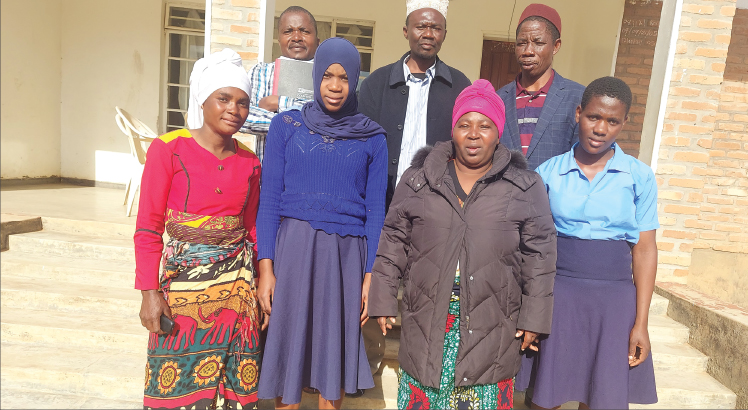Latifa Josephy, 20, of Namaninga Village, Senior Chief Bwananyambi in Mangochi District could have been added to the statistics of school dropouts in her village were it not for the goodwill of the senior chief.
When she got selected to Masuku Community Day Secondary in 2019, her dream almost got shattered because her parents could not afford to pay the K12 500 tuition.
“I stayed for almost six months at home because the school could not admit me tuition” says Latifa says when she saw no window of assistance, she opted for marriage and her parents supported the idea. Latifa says they entered into a prearranged marriage known as chitomero since she was 17 years old.
According to her, as preparations were underway, her parents received a letter from Senior Chief Bwananyambi questioning the marriage. When the chief was told the reasons, she said would support her education through her Bwananyambi Education Fund.
Bwananyambi (Second R) with the education team
“After hearing the news, I was so excited that I decided to end the relationship with the man and now I am in Form Three continuing my education so that I can achieve my dream of becoming a nurse,” she says.
Stella Zimamoto, 16, from Naimipwi Village in the area, also says she dropped out of school because of fees and got married.
Latifa and Zimamoto are among 25 girls from national, district and community day secondary schools receiving bursaries from Bwananyambi Education Fund. The fund is sponsoring 79 students of whom 54 are boys.
A 2018 report of the Borgen Project indicates that the state of girls’ education in Malawi is in critical condition.
It states that with more than 85 percent of its population living in rural areas, Malawi faces a problem of girls under-enrolled and outnumbered in the majority of primary schools.
In addition, the report says primary education attendance does not mean one will automatically go on to pursue higher level education as only six percent graduate from school each year, with only 2.9 percent going beyond post-secondary education studies.
What the Borgen reports establishes mirrors the situation in Mangochi, one of the top tourist districts in the country where girls suffer multiple barriers to education due to lack of resources.
Parents often choose to invest in education of boys than girls.
And the trend of poor parents marrying off their daughters than sending them to school is what Senior Chief Bwananyambi wants stopped.
In an interview, she said she thought of coming up with this initiative as one way of supporting the girl-child education in her area.
Bwananyambi discloses that child marriages are still a prominent cultural practice in the district, with more than 40 percent of girls married before reaching the constitutional marriage age.
She says:“As a traditional leader, I have the responsibility to end this malpractice in my area. I was having some challenges to support these girls in terms of education. Whenever I ended their marriages and forced them to go back to school, the majority were complaining about school fees and they were saying that they were forced into marriage because they had no fees and because of that, I, with my fellow traditional leaders, decided to establish this Bwananyambi Education Fund. Each village head contributes K1 000 monthly and a group village head contributes K2 000 while I contribute K5 000. We also get funds from our member of Parliament through Constituency Development Fund and also from Mangochi District Council through social welfare to help in educating the needy students in my area.”
According to her, they have ended 500 marriages in the area and 300 girls were sent back to school.
“Last year we ended 58 marriages and 38 of the girls are back to school,” she said.
Bwananyambi added that it is her desire and wish to see more educated girls in her area so that they can help develop the country both at district and national level.
However, she pleaded with government, non-governmental organisations and well-wishers to support them financially.
“We still need more funds from well-wishers since what we have is not enough. For your information, we still have fees balances,” says the traditional leader.
Government says it has come up with a girls education trust fund to support the country’s girls and is also constructing girls’ hostels in community day secondary schools that travel long distances to school.
Principal Secretary in the Ministry of Education, Chikondano Mussa, said there are a number of bursaries that promote girls’ education in the country.
“At school level, we have some structures that are there like mother groups that support girls education. We have a lot of non-governmental organisations who campaign for girls’ education. There are also conferences where such issues are addressed. All these are yielding some results because you can find out now that in terms of access we have more girls now that are accessing primary, secondary and tertiary education,” she said.
However, education analyst Limbani Nsapato said the country has a long way to go even though there are still several initiatives supporting the girl-child education.
As Senior Chief Bwananyambi intensifies efforts aimed at saving girls at risk of dropping out of school due to poverty related challenges in their homes, Josephy, Zimamoto and other girls can now afford a smile because their dream of a better future is back on track.
The post Rescuing girls from early marriages appeared first on The Nation Online.
 Moni Malawi
Moni Malawi 
